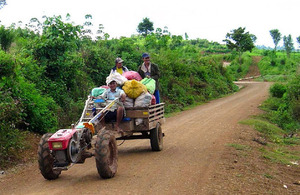DFID Research: Better rural road access leads to increased food production
DFID's research programme SEACAP in South East Asia produces solutions for regional planning and local participation.

Cambodian farmers on their way to market
Farmers with poor access are constrained to subsistence production resulting in poverty. In poor rural Cambodia agriculture is the predominant industry. The poorest have the worst physical access and spend 450% more time, traveling 3 times farther than people with better access, who are consistently better off.
Farmers with improved access harvest their surpluses, grow the local economy, and weed out poverty. The rural markets revolve around trade in local agriculture products. Rural transport infrastructure links the farm to the market. Improvements to these links rapidly and dramatically lead to expansion of agricultural production.
Indicators from Cambodia, include:
- local vehicle loads increase two to five times, with agricultural surpluses representing 61% of the load
- improved market efficiencies:
- 80% of market traffic is from the local rural villages
- 55% of the vendors sell goods at lower prices - important to the poor
- 600% increase in volume traded
- new markets are often established
- increased off-farm income and business opportunities provide capital for more investments in agriculture. For example, the emergence of rural transport businesses in which 68% of the operators are also farmers
The continued increase and diversification of agricultural production is directly dependent upon sustained rural access. These benefits are typical in SEACAP’s target countries and are confirmed throughout the DFID-funded SEACAP programme. However, the benefits are quickly reversed if rural access deteriorates. Unfortunately this is a chronic problem, which arises from insufficient knowledge to support good decision making as well as poor practice.
SEACAP’s research, dissemination and mainstreaming achievements are increasingly influencing the key stakeholders towards decisions and practices for sustained rural access investments and management. The resulting impact is first and foremost expanded and diversified agricultural surpluses in the project areas of the participating countries.
More information
Visit the global Transport Knowledge Practice (gTKP) website for more information.